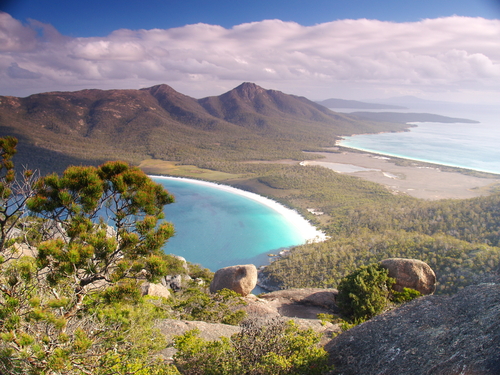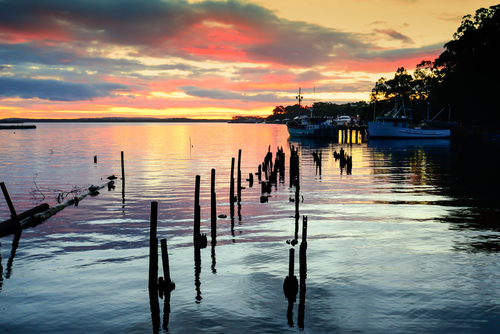
Tasmania promises a taste of the wilderness, majestic scenery, a variety of landscapes, diverting historical and cultural experiences, good food and wine, and uncluttered roads. Well, after recently spending two weeks driving all the way around the island, I can confidently say it delivers on its promise.
Here are my top 5 experiences (well, 10 really) for you to savour when you next go south.

The menu at The Captain’s Catch on the waterfront at St Helens says that the fish they serve is caught from their own boat and is served fresh that day. Sure, I thought…I’ve heard that one before. But, hold on, there is a fishing boat sitting at the pier right in front of me. And once the fish ‘n’ chips are served, there is no more scepticism: the trevalla is so deliciously fresh that it could only have been caught that day. The chips also set the standard for crunch on the outside and creaminess on the inside. You won’t read about it in the foodie press but Tassie chips (all over the island) are consistently the best anywhere in Australia. Is it the Dutch Cream potatoes, I wonder?
The coastal drive around to Binalong Bay confirms the core Tasmanian promise of landscape unsullied by human intervention. A sweeping beach and exquisite, flawless rockpools unfold in front of you. And there in one rockpool, both in wet-suits, are a father and his 8-year old daughter who are going about their commonplace chore of harvesting some abalone for lunch.
Bet you haven’t seen that happen in the bays where you live.

It’s not just Wineglass Bay, which is justifiably renowned, it’s the numerous coves and bays and walks and wallabies and crags and granite outcrops and forest. Accessible on foot or by boat, the imposing landscape of Freycinet is magnetic and captivating, drawing you further up the hill or down the escarpment. Nearby there is the freshest possible food, again. This time it’s the local oyster/mussel farm with the shucking and cooking right there in front of you. And back at the Lodge don’t bother sharing your post-dinner morsels with the tame possums. They are built of such grand proportions you know they must be well-fed….and they have sharp teeth.
If you are heading south from Coles Bay, don’t forget to drop into Freycinet Vineyards home to some of the most consistently fine Riesling, Pinot Noir and Chardonnay in Australia.

There are many different ways to experience spectacular Bruny Island, but let me unreservedly recommend the boat tours run by Pennicott Wilderness Cruises. They’ve won lots of awards, mainly because they know what they are doing. The boats are well-equipped and comfortable, the ride’s bumpy but safe, the guides are expert and cheeky in equal measure and the varied coastline of the island never less than mesmerising. They will guarantee seeing lots of seals (both Australian Fur Seals and the NZ variety) lolling in their colonies. They won’t guarantee seeing dolphins or the elusive albatross, but in our case we saw them both because the boat guides have the knack.
On the way stop off at the isthmus to see the memorial to Truganini, who as a member of the Nuenonne tribe was local to Bruny, and whose passing in 1876 marked a telling chapter in the history of the western settlement of Australia. Her remains were cremated and scattered in the nearby D’Entrecasteaux Channel in 1976 after having been retrieved from the Museum of Hobart where they had been the subject of ghoulish public scrutiny for many years.

It’s a strange little town, Queenstown: perched on precipitous bluffs, deep in the Western wilderness and deeply scarred by the previous copper mining of the Mount Lyell Mining and Railway Company. We stayed at Penghana B&B, a National Trust-listed, Federation pile sitting in the prime spot of Queenstown overlooking the township and surrounding peaks. It was built by Robert Sticht, the first General Manager of Mount Lyell in around 1898. He wasn’t very impressed with the accommodation that existed in Queenstown on his arrival so he built this mansion to provide a lifestyle more befitting to his beloved wife.
The star attraction of Queenstown is the heritage railway which has essentially retraced the path of the mining trains that brought workers into the pits and ore back to the townships. The journey on the cute little green steam-train and beautifully restored carriages winds its way through dense bush, across wooden bridges and alongside sheer river gorges.

If anything, the scenery of Cradle Mountain is decidedly more spectacular than you might gather from the usual tourist photos. The mountain, lakes and the surrounding crags all constitute a truly remarkable landscape, well worth more than a day to explore if you have the time. There is plenty of accommodation in the area but most will gravitate to the Peppers Lodge because it is the most conveniently located.
If you stay there, however, I hereby issue another possum alert.
Well, five attractions are not nearly enough to do justice to Tasmania. Hand-on-heart I can say that we did not have a dud day in the two weeks we circumnavigated the island.
So, if time allows, here are five more delights of Tassie:
PLAY GOLF at Barnbougle, Lost Farm and the cute Ulverstone Golf Club (they make the best steak in …hmmmm…NW Tasmania. No, all of Tasmania. No, Australia. No: THE WORLD)
GO TO MONA Yes it’s patchy, it’s quirky, some of it’s controversial…but it’s brilliantly staged and much of it is world-class. And one notorious exhibit puts paid to the adage of “If you’ve seen one, you’ve seen them all”.
SEE “THE WALL” On the way to Queenstown, near to Derwent Bridge, is an astonishing piece of art that you won’t forget. Carved from local timber, mainly Huon pine, it’s Australia’s rival to the Bayeux Tapestry. Big claim maybe, but I’m sure you will appreciate the comparison if you see it.
ENTER THE WILDERNESS AT CORINNA A mining town turned eco-resort Corinna is north of Strahan and at the southern-end of the Tarkine: the largest temperate rainforest in Australia. Eerie and serene rivers, ancient Huon pines, waterfalls and extensive bush tracks await you.
SEE THE MURALS AT SHEFFIELD Somehow each town in Tassie has its individual character, its unique history. For Sheffield, not far from Devonport, its thing is the mural: some 60 painted on the sides of buildings throughout the township. Then there is The Emporium containing a bewildering array of bric-a-brac and as comprehensive a collection of vinyl LPs that any bona-fide baby-boomer could wish for.